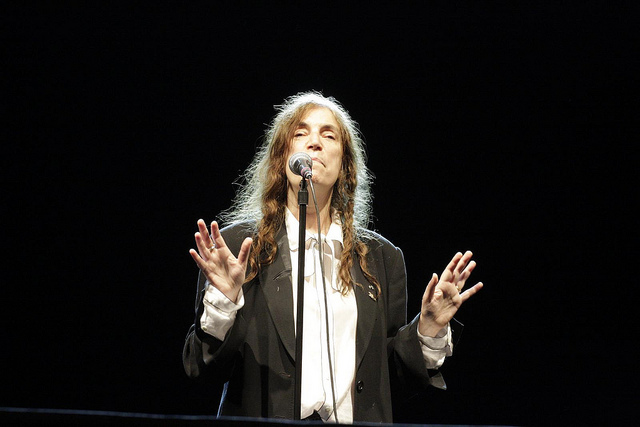If I weren’t a Christian, my religion would be Patti Smith: Unlikely rock-n-roll icon, collector of religious iconography, all around bad-ass mamba-jahamba. Smith’s memoir Just Kids is one of the weirdest, loveliest, most endearingly droll books I’ve ever read, and she’s been at work for awhile on a sequel. Earlier today, Pitchfork and Entertainment Weekly announced that the sequel, called M Train, will be published by Knopf in October.
Smith grew up in New Jersey and was raised as a Jehovah’s Witness, a group that considers itself Christian but whose unorthodox beliefs– such as a denial of the Trinity and belief that only 144,000 people will make it to heaven–has isolated it from other denominations. It was, Smith recounted, an “austere faith, culturally and artistically,” and so she abandoned regular Bible study at the age of 12 or 13. But her deep interest in the human condition–the curiosity that, I think, is one of her greatest gifts as a writer–kept her coming back to the questions of religion and philosophy. Just Kids is full of questions like, “Where does it all lead? What will become of us?” and Smith quotes Rimbaud and Baudelaire with the same intense fascination she reserves for art. She was drawn to her romantic and artistic partner Robert Mapplethorpe in part because of the religious nature of his early work:
When we first met [Robert’s] work reflected a belief in God as universal love. Somehow he got off track. His Catholic preoccupation with good and evil reasserted itself, as if he had to choose one over the other. He had broken from the Church, now it was breaking within him…
I’ve always been curious about how people who are not in the middle of one particular religion experience religion’s good, and Smith is a wonderful case study in this topic. She isn’t resentful or angry, for the most part, but innately eager to know how other people make sense of the transcendental. In this way, which may sound strange, she reminds me of my mom. My mom has been a Christian since she was very young, and one of her deepest and most winsome beliefs is that God made the world too good for us to be able to experience all of it while we live, so heaven will be full of even more goodness than that. It isn’t a particularly Biblical idea, and some conservative bloggers would be happy to rip it apart, but it’s so consistent with the character of God to think that we would be utterly delighted by a heaven of God’s creating. And Smith is interested in what God has created.
She is also interested in what man created, which is why she collects and enjoys religious art:
I look at [the trappings of religion] as the beauty of man’s imagination. However, no matter how many times it’s said or simplistic it sounds, everything stems from love. If someone wanted to understand Christ’s teachings for instance, it’s based on love and to love one another. Everything else could fall away: the dogma, the art, the churches, everything. It’s basically to love one’s self, to love one another, to love the earth.
But the imagination and the mind of man is so interesting and captivating. So I am attracted to religious arts from all faiths, from the poetry that comes from it. I’m attracted to the prayers and the vestments that people where, but I don’t mistake these things for the absolute principle.
M Train features Smith visiting the graves of some of her literary heroes, going to her favorite coffee shop, and her marriage to MC5 guitarist Fred Smith. If it is anything like Just Kids, it will be strange and singular, a guided tour down the rabbit hole of what is good in the world.





